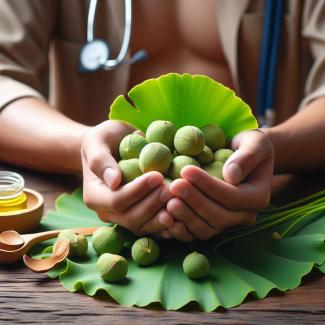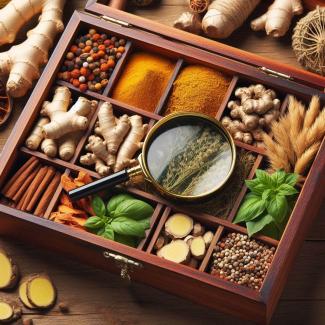
Ginkgo biloba, one of the oldest living tree species, has a rich history in traditional medicine, particularly in Chinese herbalism. Known for its distinctive fan-shaped leaves and resilience, Ginkgo biloba is often celebrated for its cognitive enhancement properties, but recent research has also highlighted its potential benefits for sexual function and arousal. This extensive description delves into the various ways Ginkgo biloba may positively influence sexual health, supported by scientific studies and mechanisms of action.
Botanical Characteristics and Historical Use Ginkgo biloba is a deciduous tree native to China, where it has been cultivated for thousands of years. Traditionally, its leaves and seeds have been utilized for various ailments, including respiratory disorders, circulatory issues, and cognitive decline. The leaves are rich in flavonoids and terpenoids, compounds believed to possess antioxidant properties, which play a role in enhancing blood flow and supporting overall health.
Mechanisms of Action
- Vasodilation and Blood Circulation: One of the key ways Ginkgo biloba may enhance sexual function is through its vasodilatory effects. Research indicates that the extracts of Ginkgo biloba can improve blood circulation by dilating blood vessels. This is particularly crucial for sexual arousal, as adequate blood flow to the genital area is necessary for achieving and maintaining erections in men and increasing sensitivity in women.
- Nitric Oxide Production: Ginkgo biloba may also stimulate the production of nitric oxide (NO), a molecule that plays a vital role in erectile function. Increased NO levels enhance blood flow and improve erectile responses by relaxing the smooth muscles in blood vessels, facilitating erections.
- Antioxidant Properties: The antioxidant properties of Ginkgo biloba help combat oxidative stress, which can negatively affect sexual health. By neutralizing free radicals, Ginkgo biloba may protect endothelial cells that line blood vessels, thereby promoting better vascular health.
- Impact on Hormones: Some studies suggest that Ginkgo biloba might influence hormonal levels, particularly testosterone, which plays a critical role in sexual desire and function. Increased testosterone levels can lead to improved libido and sexual performance.
Clinical Studies and Findings Numerous studies have explored the effects of Ginkgo biloba on sexual function:
- Erectile Dysfunction (ED): A study published in the Journal of Sex Medicine found that Ginkgo biloba extract significantly improved erectile function in men with ED, particularly those experiencing side effects from antidepressant medications. Participants reported enhanced satisfaction and sexual performance after supplementing with Ginkgo biloba.
- Libido Enhancement: Research has shown that Ginkgo biloba may enhance libido in women, particularly those experiencing sexual dysfunction due to menopause or hormonal changes. In a clinical trial, women who took Ginkgo biloba reported increased sexual desire and improved arousal compared to the placebo group.
- Overall Sexual Satisfaction: A study involving both men and women indicated that Ginkgo biloba supplementation led to an overall increase in sexual satisfaction, with participants noting improvements in both physical arousal and emotional connection during sexual activities.
Dosage and Administration The recommended dosage of Ginkgo biloba can vary based on the form of the supplement. Commonly, extracts are taken in doses ranging from 120 mg to 240 mg per day, divided into two or three doses. It’s essential to consult a healthcare professional before starting supplementation, especially for individuals on medications or with underlying health conditions.
Potential Side Effects and Considerations While Ginkgo biloba is generally considered safe for most individuals, some may experience side effects, including gastrointestinal upset, headaches, or allergic skin reactions. Additionally, Ginkgo biloba can interact with anticoagulant medications and should be used cautiously in individuals with bleeding disorders. Therefore, it is crucial to discuss any supplement use with a healthcare provider.
Ginkgo biloba presents a compelling natural option for enhancing sexual function and arousal, supported by its mechanisms of action, including improved blood circulation, antioxidant properties, and potential hormonal effects. As research continues to unfold, Ginkgo biloba may solidify its place as a beneficial supplement for those seeking to enhance their sexual health and well-being. While further studies are needed to establish standardized dosages and long-term effects, the existing evidence highlights its potential as a valuable ally in the realm of sexual enhancement.
Ginkgo Biloba: Unveiling the Secrets of Its Mechanisms and Benefits
Ginkgo biloba, revered for its extensive therapeutic properties, is a unique species that has survived since the time of the dinosaurs. Beyond its rich history and cultural significance, Ginkgo biloba has gained attention for its multifaceted effects on health, particularly concerning sexual function. This extensive overview aims to unveil the secrets of how Ginkgo biloba works, focusing on its mechanisms, scientific evidence, and potential benefits for sexual arousal and function.
Historical Context and Traditional Uses Ginkgo biloba's use dates back thousands of years in traditional Chinese medicine, where it was employed to enhance memory, improve blood flow, and alleviate various ailments. The leaves, primarily used in herbal preparations, are rich in active compounds that contribute to its therapeutic effects.
Active Components and Their Roles Ginkgo biloba contains several key active components, primarily flavonoids and terpenoids, which play crucial roles in its health benefits:
- Flavonoids: These antioxidants help protect cells from oxidative stress, improve circulation, and enhance endothelial function. They also contribute to the anti-inflammatory properties of Ginkgo biloba.
- Terpenoids: Ginkgolides and bilobalide, the principal terpenoids in Ginkgo biloba, support improved blood flow and have neuroprotective effects. They inhibit platelet-activating factor, which can enhance circulation.
Mechanisms of Action
- Enhanced Blood Circulation: Ginkgo biloba is well-known for its ability to improve microcirculation. The flavonoids in Ginkgo help dilate blood vessels, thus increasing blood flow to various organs, including the genital area. This mechanism is essential for sexual arousal, as it facilitates the physiological changes necessary for arousal and performance.
- Nitric Oxide Modulation: One of the critical pathways through which Ginkgo biloba exerts its effects is by enhancing the production of nitric oxide (NO). Nitric oxide is vital for erectile function, as it relaxes the smooth muscles in blood vessels, allowing for increased blood flow. Research indicates that Ginkgo may enhance the bioavailability of NO, contributing to improved erectile responses.
- Hormonal Effects: Ginkgo biloba may also influence hormone levels, particularly testosterone, which plays a significant role in sexual desire and arousal. Studies have suggested that Ginkgo supplementation could lead to increased testosterone levels, further enhancing libido and sexual performance.
- Antioxidant Protection: The antioxidant properties of Ginkgo biloba protect endothelial cells from damage caused by oxidative stress. Healthy endothelial function is crucial for maintaining vascular health, which directly affects sexual function.
- Neurological Impact: Ginkgo biloba's neuroprotective effects may enhance sexual function by improving mood and reducing anxiety. Stress and anxiety are known factors that can negatively impact sexual performance. By enhancing cognitive function and reducing stress levels, Ginkgo may indirectly promote better sexual health.
Scientific Studies and Evidence
- Erectile Dysfunction Research: Numerous clinical studies have investigated the effects of Ginkgo biloba on erectile dysfunction (ED). A meta-analysis of randomized controlled trials indicated that Ginkgo biloba significantly improved erectile function in men suffering from ED, particularly those experiencing medication-induced side effects.
- Libido Enhancement in Women: A pivotal study evaluated the impact of Ginkgo biloba on sexual desire in premenopausal women. Results showed that those who supplemented with Ginkgo reported notable improvements in libido and overall sexual satisfaction, suggesting its efficacy in addressing female sexual dysfunction.
- Psychological Benefits: In addition to its physical effects, Ginkgo biloba has been associated with improved mental well-being. A study highlighted that participants taking Ginkgo experienced reduced anxiety levels, which contributed to enhanced sexual desire and performance.
Dosage and Safety Considerations The efficacy of Ginkgo biloba can depend on the dosage and form of administration. Standardized extracts typically range from 120 mg to 240 mg per day. It is essential to choose a reputable product to ensure quality and potency. Individuals considering Ginkgo supplementation should consult a healthcare provider, especially those on anticoagulants or with bleeding disorders, as Ginkgo can affect blood clotting.
Ginkgo biloba is a remarkable herbal remedy with a myriad of benefits for sexual function and arousal. Through its mechanisms of enhancing blood circulation, modulating nitric oxide levels, influencing hormones, and providing antioxidant protection, Ginkgo biloba offers a holistic approach to improving sexual health. Its long-standing use in traditional medicine, supported by modern scientific research, underscores its potential as a valuable supplement for enhancing sexual function and overall well-being. As research continues to uncover its secrets, Ginkgo biloba remains a fascinating subject of study in the quest for better sexual health.
Ginkgo Biloba: Sourcing and Consumption
Ginkgo biloba is renowned for its numerous health benefits, including enhancing cognitive function and improving sexual health. While commonly available as a dietary supplement, many wonder whether it can be obtained through food sources or other means. This description delves into the ways to access Ginkgo biloba, its forms of availability, and best practices for consumption.
Natural Sources of Ginkgo Biloba
- Leaves and Tea: The leaves of the Ginkgo biloba tree are the primary source of the beneficial compounds associated with this herb. Fresh Ginkgo leaves can be brewed into a tea, though this method is less common today due to the availability of more concentrated extracts. Traditional preparations often involved using the leaves for teas or tinctures, but care must be taken, as fresh Ginkgo leaves contain compounds that can be toxic in large amounts.
- Seeds: Ginkgo seeds are another natural source, often used in Asian cuisines. The seeds are typically cooked before consumption to reduce potential toxicity. They have been used in traditional dishes, especially in Chinese cuisine, where they can be found in congee, soups, and other recipes. However, caution is advised, as raw seeds contain ginkgotoxin, which can cause adverse effects.
Supplement Forms Ginkgo biloba is predominantly available in various supplement forms, making it accessible for those seeking its benefits:
- Extracts: The most common form is standardized Ginkgo biloba extract, which is often sold in capsules or tablets. These extracts are concentrated and provide a consistent dosage of the active compounds. Standardized extracts typically contain 24% flavone glycosides and 6% terpene lactones, ensuring potency.
- Liquid Extracts: Ginkgo biloba is also available in liquid extract form, which can be taken directly or added to beverages. This form is beneficial for those who prefer liquid supplements or have difficulty swallowing pills.
- Powdered Forms: Ginkgo powder is another option, allowing for versatile use in smoothies or as an additive in various recipes. It is essential to use a high-quality product to ensure the retention of beneficial compounds.
Where to Purchase Ginkgo Biloba
- Health Food Stores: Many local health food stores or natural product retailers stock Ginkgo biloba in various forms, including capsules, teas, and extracts. Staff can often provide recommendations on dosages and forms suitable for specific needs.
- Pharmacies: Most pharmacies carry dietary supplements, including Ginkgo biloba. It's advisable to choose well-known brands that offer transparency regarding their sourcing and standardization.
- Online Retailers: Numerous reputable online platforms specialize in dietary supplements. When purchasing online, ensure that the retailer provides third-party testing results to verify the product's purity and concentration.
- Traditional Medicine Practitioners: Some practitioners of herbal medicine may offer Ginkgo biloba as part of their treatment plans. Consulting with a knowledgeable herbalist can provide personalized recommendations based on individual health needs.
Consumption Guidelines When incorporating Ginkgo biloba into your routine, consider the following guidelines:
- Dosage: Typical dosages range from 120 mg to 240 mg per day, depending on the form and individual needs. It’s crucial to follow the manufacturer’s instructions or consult a healthcare professional for personalized advice.
- Timing: Ginkgo biloba can be taken at any time of day, but consistency is key for achieving the desired effects. Some individuals prefer to take it in the morning to avoid potential interference with sleep.
- Potential Interactions: Ginkgo biloba can interact with certain medications, including anticoagulants and antidepressants. It’s essential to consult with a healthcare provider before starting Ginkgo, particularly for individuals on prescription medications or with underlying health conditions.
Ginkgo biloba is a versatile herb that can be obtained through various means, from natural food sources to concentrated supplements. While fresh leaves and seeds offer traditional culinary options, the extract forms provide a more reliable way to access its health benefits. Whether through health food stores, pharmacies, or online retailers, it is crucial to choose high-quality products and consult with healthcare professionals to ensure safe and effective use. By understanding how to source and consume Ginkgo biloba, individuals can effectively incorporate this ancient remedy into their health regimen.
Ginkgo Biloba: Growth Habitats and Cultivation Guide
Ginkgo biloba, often referred to as the "maidenhair tree," is a unique species known for its resilience and distinctive fan-shaped leaves. Its numerous health benefits have led to increased interest in its cultivation. This detailed description explores the natural habitats of Ginkgo biloba, its cultivation requirements, and practical advice for those interested in growing it themselves.
Natural Habitat of Ginkgo Biloba
- Native Range: Ginkgo biloba is native to China, where it has been cultivated for over 2,500 years. In the wild, it grows in a variety of habitats, including forested areas, along riverbanks, and in mountainous regions. The tree thrives in temperate climates with distinct seasonal changes.
- Climate Preferences: Ginkgo biloba is adaptable and can grow in various climates, from temperate to subtropical zones. It prefers environments with well-defined seasons, including cold winters and warm summers. The tree is hardy and can tolerate pollution, making it a popular choice for urban landscapes.
- Soil Conditions: Ginkgo biloba thrives in well-drained soils with a pH range of 5.0 to 7.5. While it prefers loamy soils rich in organic matter, it can also adapt to clay and sandy soils. Proper drainage is essential, as Ginkgo does not tolerate waterlogged conditions.
Cultivating Ginkgo Biloba: A Step-by-Step Guide
- Seeds vs. Seedlings: Ginkgo biloba can be propagated from seeds or seedlings. While seeds are widely available, they require a longer germination time. Purchasing established seedlings from a nursery may be a more convenient option for beginners.
- Planting Time: The best time to plant Ginkgo biloba is in early spring or fall, allowing the tree to establish roots before the heat of summer or the cold of winter sets in.
- Site Selection: Choose a location that receives full sun to partial shade. Ginkgo trees prefer sunny spots but can tolerate some shade. Ensure there is enough space for the tree to grow, as they can reach heights of 50 to 80 feet and have a broad canopy.
- Soil Preparation: Before planting, amend the soil with organic compost to improve nutrient content and drainage. Ensure the planting hole is deep and wide enough to accommodate the root system without crowding.
- Planting Process:
- For Seeds: Soak seeds in water for 24 hours before planting. Plant seeds about 1 inch deep and 3 feet apart. Germination can take several months, so patience is essential.
- For Seedlings: Dig a hole large enough for the root ball of the seedling. Place the seedling in the hole and backfill with soil, ensuring that the root collar is level with the soil surface. Water thoroughly after planting.
- Watering and Care: Regular watering is crucial during the first few years of growth. Ensure the soil remains moist but not soggy. Once established, Ginkgo biloba is relatively drought-tolerant and requires minimal maintenance.
- Fertilization: Apply a balanced fertilizer in early spring to promote healthy growth. Avoid excessive fertilization, as Ginkgo biloba can thrive in less fertile soils.
- Pruning: Pruning is generally not required, but minor trimming can help shape the tree or remove any dead or damaged branches. Perform pruning in late winter or early spring before new growth begins.
- Pests and Diseases: Ginkgo biloba is resistant to many pests and diseases. However, keep an eye out for common issues such as scale insects or leaf galls. If detected, treat with appropriate organic or chemical solutions.
Harvesting Ginkgo Biloba Once established, Ginkgo biloba can be harvested for its leaves and seeds. The leaves are typically collected in late summer or early autumn, while seeds can be gathered in the fall when they fall from the tree. Remember to handle seeds with care, as they can be toxic when raw.
Ginkgo biloba is a remarkable tree that offers both aesthetic value and health benefits. With proper care and attention, it can be successfully cultivated in home gardens or landscapes. Whether you choose to grow it for its medicinal properties or as a beautiful ornamental tree, Ginkgo biloba can be a rewarding addition to any garden.
Ginkgo Biloba: Overview of Commercial Products Available in the Market
Ginkgo biloba, celebrated for its cognitive enhancement and health benefits, is widely available in various commercial products. These products cater to a diverse audience interested in leveraging the potential advantages of Ginkgo biloba. This detailed description examines the types of products on the market, their uses, and key considerations for consumers.
Types of Ginkgo Biloba Products
- Standardized Extracts
- Capsules and Tablets: These are the most common forms of Ginkgo biloba supplements. Standardized extracts usually contain 24% flavone glycosides and 6% terpene lactones, ensuring a consistent dose. Brands like Nature's Way and NOW Foods offer reputable options.
- Dosage: Typically, the recommended dosage ranges from 120 mg to 240 mg per day, divided into two or three doses. Always follow label instructions or consult a healthcare professional.
- Liquid Extracts and Tinctures
- Description: Ginkgo biloba is available as a liquid extract or tincture, allowing for flexible dosing. These products can be taken directly or added to beverages.
- Brands: Popular brands like Herb Pharm and Gaia Herbs produce high-quality liquid extracts that often emphasize organic sourcing and potency.
- Ginkgo Tea
- Description: Dried Ginkgo leaves are used to make herbal teas. This form offers a milder dosage and is often favored for its pleasant taste.
- Availability: Brands such as Traditional Medicinals and Numi offer Ginkgo tea blends, sometimes combined with other herbs to enhance flavor and health benefits.
- Ginkgo Powder
- Description: Ginkgo biloba powder can be added to smoothies, oatmeal, or other foods for an easy way to incorporate the herb into the diet. This form retains the active compounds found in the leaves.
- Usage: Brands like BulkSupplements and Starwest Botanicals provide powdered Ginkgo that is often used in nutritional formulations or homemade health products.
- Combination Supplements
- Description: Some products combine Ginkgo biloba with other herbs or nutrients, such as Ginseng, Bacopa monnieri, or Omega-3 fatty acids, targeting cognitive health or overall wellness.
- Brands: Look for reputable formulations from companies like Jarrow Formulas or Garden of Life, which offer blends designed for brain health and memory support.
- Topical Products
- Description: Although less common, some topical creams and ointments incorporate Ginkgo biloba for its antioxidant properties and potential skin benefits. These products aim to enhance circulation and promote skin health.
- Examples: Brands like Reviva Labs may offer creams that combine Ginkgo extract with other nourishing ingredients.
Choosing the Right Product When selecting a Ginkgo biloba product, consider the following:
- Quality and Standardization: Opt for products that specify the concentration of active compounds. Standardized extracts ensure that you receive a consistent and effective dose.
- Reputable Brands: Choose products from established companies that provide transparency regarding sourcing and manufacturing practices. Look for third-party testing to verify purity and potency.
- Formulation Type: Depending on your preferences, decide whether capsules, liquids, powders, or teas suit your lifestyle and health goals best.
- Consultation with Healthcare Professionals: Before starting any supplement, especially if you have underlying health conditions or are taking other medications, consult a healthcare provider to avoid potential interactions.
Ginkgo biloba is available in a multitude of commercial products, catering to various preferences and health objectives. Whether you choose standardized extracts, teas, or combination supplements, understanding the options and their proper use can help you effectively incorporate Ginkgo biloba into your wellness regimen. Always prioritize quality and consult professionals when necessary to ensure safety and efficacy in your health journey.






